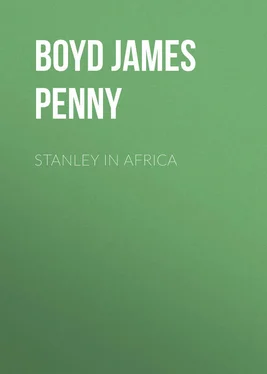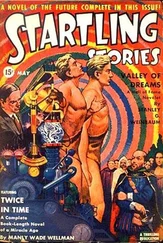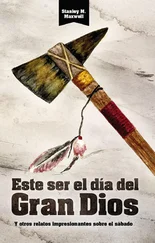James Boyd - Stanley in Africa
Здесь есть возможность читать онлайн «James Boyd - Stanley in Africa» — ознакомительный отрывок электронной книги совершенно бесплатно, а после прочтения отрывка купить полную версию. В некоторых случаях можно слушать аудио, скачать через торрент в формате fb2 и присутствует краткое содержание. Жанр: foreign_antique, foreign_prose, на английском языке. Описание произведения, (предисловие) а так же отзывы посетителей доступны на портале библиотеки ЛибКат.
- Название:Stanley in Africa
- Автор:
- Жанр:
- Год:неизвестен
- ISBN:нет данных
- Рейтинг книги:3 / 5. Голосов: 1
-
Избранное:Добавить в избранное
- Отзывы:
-
Ваша оценка:
- 60
- 1
- 2
- 3
- 4
- 5
Stanley in Africa: краткое содержание, описание и аннотация
Предлагаем к чтению аннотацию, описание, краткое содержание или предисловие (зависит от того, что написал сам автор книги «Stanley in Africa»). Если вы не нашли необходимую информацию о книге — напишите в комментариях, мы постараемся отыскать её.
Stanley in Africa — читать онлайн ознакомительный отрывок
Ниже представлен текст книги, разбитый по страницам. Система сохранения места последней прочитанной страницы, позволяет с удобством читать онлайн бесплатно книгу «Stanley in Africa», без необходимости каждый раз заново искать на чём Вы остановились. Поставьте закладку, и сможете в любой момент перейти на страницу, на которой закончили чтение.
Интервал:
Закладка:
The next day’s steaming is through numerous villages, banana groves, palm groups, and an agreeable alternation of bluff and vale. The Levy Hills approach the water in the airy red projections of Iyumbi. The natives gaze in awe upon the passing flotilla, as much as to say, “What does it all mean?” “Has doom indeed dawned for us?” Two hours above Iyumbi the steamers lose their way in the multitude of channels, and have to put back. On their return, twenty canoes are sighted in a creek. Information must be had, and the whale-boat is launched and ordered to visit the canoes. At sight of it, the occupants of the canoes flee. Chase is given, and five miles are passed before the whale-boat catches up. The occupants of the canoes are found to be women, who jump into the water and escape through the reeds to the shore. They prove dumb to all inquiries as to the river courses, and might as well have been spared their fright.
On May 31st the journey was against a head wind, and so slow that two trading canoes, each propelled by twenty By-yanzi paddles, bound for Ubangi, kept pace with the steamers all day. Provisions were now running low. Since leaving Bolobo, the eighty natives and seven Europeans had consumed at the rate of 250 pounds of food daily. It was therefore time to prepare for barter with the settlement which came into view on June 1st, and which the guides called Lukolela.
Lukolela is a succession of the finest villages thus far seen on the Congo. They are composed of substantial huts, built on a bold shore, and amid a primeval forest, thinned of its trees to give building spaces. The natives are still of the Wy-yanzi tribe, and whether friendly or not, could not be ascertained on first approach. Stanley took no chances with them, but steaming slowly past their five mile of villages, he ordered all the showy calicoes and trinkets to be displayed, and placed his guides and interpreters in the bows of the boats to harangue the natives and proclaim his desire to trade in peace. Though the throng gradually increased on the shore and became more curious as each village was passed, it gave no response except that the country had been devastated by frightful disease and was in a state of starvation. Horrid indeed was the situation, if they spoke the truth! But what of the fat, well-to-do looking people on the banks? Ah! there must be something wrong somewhere! The steamers passed above the villages and put up for the night. Soon the natives came trooping from the villages, bearing loads of fowls, goats, plantains, bananas, cassava, sweet-potatoes, yams, eggs, and palm-oil, and all eager for a trade. Barter was brisk that night, and was resumed the next morning, when canoe after canoe appeared, loaded down with rations. A supply of food for eight days was secured. They excused their falsehoods of the previous day to the fear they had of the steamers. On finding that they were not dangerous, their cowardice turned into admiration of a craft they had never seen before.
The Congo now ran through banks 100 feet high and a mile and a half apart, clothed with magnificent timber. Between these the flotilla sailed on June 2d, being visited occasionally by native fishermen with fish to sell. The camp this night was in a deserted spot, with nothing to cheer it except dense flocks of small birds, followed by straggling armies of larger ones resembling crows. On the evening of June 3d the steamers reached a point a few miles below Ngombé. Here Stanley was surprised to hear his name called, in good English, by the occupants of two canoes, who had fish and crocodiles to sell. He encouraged the mongers by making a purchase, and on inquiry found that the natives here carry on quite a brisk trade in young crocodiles, which they rear for the markets. They procure the eggs, hatch them in the sand, and then secure the young ones in ponds, covered with nets, till they are old enough to market.
Ngombé was now sighted, on a bank 40 feet above the river, amid a wealth of banana groves and other signs of abundance. Above and below Ngombé the river is from four to five miles wide, but here it narrows to two miles and flows with a swift current. The sail over the wide stretch above Ngombé was through the land of the Nkuku, a trading people. At Butunu the steamers were welcomed with delight, and the shores echoed with shouts of “Malamu!” Good! But it remained for the Usindi to greet the travelers with an applause which was ridiculously uproarious. Hundreds of canoes pushed into the stream, followed and surrounded the steamers, their occupants cheering as though they were frantic, and quite drowning every counter demonstration. At length a dozen of them sprang aboard one of the steamers, shook hands with all the crew, and gratified their curiosity by a close inspection of the machinery and equipments. Then they would have the steamers put back to their landing at Usindi, where the welcome was continued more obstreperously than ever. The secret of it all was that these people were great river traders, and many of them had been to Leopoldville and Kintamo, 300 miles below, where they had seen houses, boats and wagons. They were a polished people, not given to show of their weapons for purposes of terrorizing their visitors, and kindly in the extreme. Iuka, their king, besought Stanley to make a station at Usindi and enter into permanent trade relations with his people.
A very few miles above Usindi the flotilla entered a deep channel of the Congo, which seemed to pass between fruitful islands, whose shores were lined with people. They were ominously quiet till the steamers passed, when they gave pursuit in their canoes. The steamers stopped, and the pursuers made the announcement that they bore an invitation from King Mangombo, of Irebu, to visit him. Mention of the Irebu was enough to determine Stanley. They are the champion traders of the Upper Congo, and are equalled only by the powerful Ubanzi who live on the north side of that great flood. The Irebu have, time and again, borne down upon the Lukolela, Ngombé, Nkuku, Butunu and Usindi, and even the fierce Bengala, and taught them all how to traffic in peace and with credit.
When the steamers came to anchor at Mangambo’s village, the aged king headed a procession of his people and welcomed Stanley by shaking his hand in civilized fashion. There were cheers, to be sure, but not the wild vociferations of those who looked upon his flotilla as something supernatural. There was none of that eager curiosity which characterizes the unsophisticated African, but a dignified bearing and frank speech. They had an air of knowledge and travel which showed that their intercourse with the trading world had not been in vain. They know the Congo by heart from Stanley Pool to Upoto, a distance of 600 miles; are acquainted with the military strength and commercial genius of all the tribes, and can compute the value of cloth, metals, beads and trinkets, in ivory, livestock and market produce, as quickly as the most skillful accountant. Blood brotherhood was made with Mangombo, valuable gifts were interchanged, and then the chief, in a long speech, asked Stanley to intercede in his behalf in a war he was waging with Magwala and Mpika, – which he did in such a way as to bring about a truce.
The large tributary, Lukanga, enters the Congo near Irebu, with its black waters and sluggish current. The flotilla left the mouth of the Lukanga on June 6th, and after a sail of 50 miles, came to Ikengo on June 8th. The route had been between many long islands, heavily wooded, while the shores bore an unbroken forest of teak, mahogany, gum, bombax and other valuable woods. At Ikengo the natives came dashing into the stream in myriad of canoes shouting their welcomes and praising the merits of their respective villages. Here it was, “Come to Ikengo!” There it was, “Come to Itumba!” Between it was, “Come to Inganda!” With all it was, “We have women, ivory, slaves, goats, sheep, pigs,” etc. It was more like a fakir scene in Constantinople or Cairo than a pagan greeting in the heart of the wilderness. Perhaps both their familiarity and importunity was due in great part to the fact they remembered Stanley on his downward trip years before.
Читать дальшеИнтервал:
Закладка:
Похожие книги на «Stanley in Africa»
Представляем Вашему вниманию похожие книги на «Stanley in Africa» списком для выбора. Мы отобрали схожую по названию и смыслу литературу в надежде предоставить читателям больше вариантов отыскать новые, интересные, ещё непрочитанные произведения.
Обсуждение, отзывы о книге «Stanley in Africa» и просто собственные мнения читателей. Оставьте ваши комментарии, напишите, что Вы думаете о произведении, его смысле или главных героях. Укажите что конкретно понравилось, а что нет, и почему Вы так считаете.












